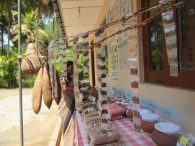
Sri Lanka is one of the first countries that follow the Green Revolution methods in agriculture since the beginning of 1970s. The successive governments came into power and the Ministry and Department of Agriculture in particular gave their full blessings for the implementation of these methods. Hence by now, the traditional ways of farming have already disappeared to a large extent, and the remaining practices are fast diminishing.
The government aggravates the problem by issuing chemical fertilizer to the farmers with a huge portion of subsidy, which stands for 09/10 of the real price. As a result of implementing the whole package of “green revolution” by the government, the local and traditional seeds were replaced by hybrid seeds, which could be planted only once. Some of the farmers had realized that this was a trap as the whole agriculture had to depend on the exported seeds, which have to be followed by the excessive usage of chemical fertilizer, herbicides, and pesticides.

With the support of MONLAR, the NIA in Sri Lanka, a “Seed Caravan” was organized in order to make the farmers and general public aware and sensitize on the “seed problem” that the country is facing.
The low-input, climate, and pest resistant local seeds are fast disappearing, and replaced by hybrid seeds imported mostly from Malaysia. The farmers now use to ‘Malaysian seeds’ that are high-input varieties. Most of the plant that comes from the local varieties are medicinal plants which are used for making Ayurvedic medicines. However, the substitute plants from the Malaysian seeds do not have the medicinal value and the quality of the local and traditional seeds.
The farmers who are in the MTCP program decided to act in order to protect the traditional and local seeds despite the threat that prevents the farmers in collecting, preserving, multiplying, and sharing seeds under the proposed Seed Act which faced massive protests from farmer organizations (FOs). Lanka Farmer’s Forum (LFF), initiated by the MTCP program, encourages the farmer organizations to collect, preserve and multiply the local seeds.
FOs in Udalumada village have already started “Seeds Banks”, through which they share the local and traditional seeds among the members of FOs. So far, the collecting, exchanging, multiplying of traditional seed paddy and beans is successful. The system is developed so that the FOs and farmers are able to provide traditional seed paddy to any farmer who is interested in growing them.



Comments are closed